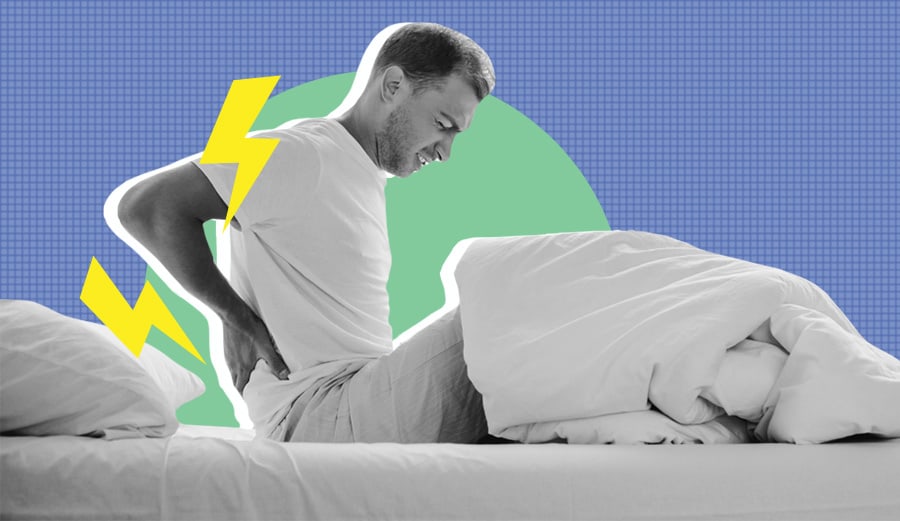
Your back hurts, so you can’t sleep. But wait. When you can’t sleep, your back hurts. What gives? Turns out, both are right, according to new research that digs into the two way relationship between one of the most common types of chronic pain, and one of the most common sleep issues. In addition, anxiety and depressive symptoms are often in the mix with these two conditions at play, further complicating the problem, and therefore the potential solutions.
Recent Study Says Back Pain Leads to Anxiety
A recent study found that there may be a link between chronic low back pain and anxiety-depressive and sleep disorders. (1) The study was conducted by researchers in Tunisia and involved a cross-sectional study of the rheumatology department at Charles Nicolle Hospital, between November 2022 and December 2023. The study was small and included 85 male patients suffering with chronic low back pain with an average age of 53 years old. Additionally, patients had various causes of chronic back pain, including disc herniation (28 percent), scoliosis (9 percent), degenerative discopathy (32 percent), and others. Pain intensity impacted sleep disorders.
Research observed anxiety in 40 percent of patients and 27 percent of patients experienced major depressive syndrome. Researchers used the Hospital Anxiety and Depression Scale (HADS) and the Pittsburgh Sleep Quality Index (PSQI) to help assess anxiety-depressive syndrome and sleep disorders. They also found that a sedentary lifestyle and smoking were linked to anxiety-depressive disorders in patients with low back pain.
What do Experts Think?
So back pain, anxiety, and insomnia are often a tough trio to combat. It isn’t the first time researchers have made this connection, which other studies confirm. For example, a 2023 study found that there is a direct relationship between sleep disturbance, depression and pain.
“Any chronic pain, when not addressed or treated, will create more fragmented sleep. As it is already difficult for a person suffering from insomnia to fall asleep, once you add in chronic pain, staying asleep will be challenging, especially when neurological issues, discomfort and aches are ongoing,” says Dr. Jerry Hu, a triple board-certified sleep medicine expert with training in Chirodontics at Nevada Dental Sleep in Las Vegas. He says it comes down to alignment — or spinal misalignment, in these cases.
“It is a chicken or egg situation, and asking yourself which one comes first? If you have back pain, it can keep you from sleeping and not sleeping could give you back pain. People who aren’t sleeping, they’re mind is racing, they’re not able to get into a comfortable position,” says Dr. Patrick Nuzzo, Doctor of Naprapathy and co-founder of Southwest University of Naprapathic Medicine in Santa Fe, N.M.
“If you don’t sleep well, musculoskeletal issues can come up because of the tossing and turning, the uneasiness, the stress. The body starts to constrict under stress and with tossing and turning, and then not sleeping you actually become more stressed. It’s a vicious cycle. Without proper rest, your body is never able to restore. Chronic back pain and insomnia really go hand in hand,” he adds.
So what can back pain-insomnia-anxiety sufferers do about this conundrum? Quite a few things, the experts share. Hu recommends chiropractic care to improve alignment. Nuzzo shares the following tips:
- Prioritize self-care and evaluate your lifestyle. In order to relax before bed, you can look into meditation and breathing exercises to calm the mind and body down.
- When you sleep it’s important to lay on your back, put a pillow under the knees and put a pillow under the neck. You want the pillow to support the neck, not the back of the head. “There are pillows made with memory foam that have a cervical curve, and those are helpful…You really have to retrain the body to relax and sleep in positions that are not going to exacerbate the pain.”
- Stay hydrated. “Many people don’t realize how much of a factor dehydration can be when it comes to pain in the body. Just like a sponge, when you wet it, ring it out, and put it in the sink, it’s hard and crusty the next day. If you’re not hydrating, your tissues really dry out and this will create inflammation and pain. Hydrating and incorporating a stretching routine into your life is one of the best things you can do.”
- Movement, in general is good, too. Taking walks, exercise, strengthening the muscular and skeletal systems with very light weight training for the upper and lower body are also very important.
While people might look for a medication to help ease symptoms, Nuzzo believes that medications don’t often work as well for neuromusculoskeletal pain and insomnia. “It’s about lifestyle change. There was a study in the American Journal of Clinical Nutrition involving 1 million veterans looking at lifestyle factors and how changes with diet and exercise and stress management have the greatest impact on overall health.”
So while there doesn’t seem to be a silver bullet style solution, addressing the chicken AND the egg through the above tips might be a start.
Sources
1. Derman, Chelsie; “Chronic Low Back Pain May be Linked to Anxiety, Depression, or Sleep Disorders,” HCP Live; https://www.hcplive.com/view/chronic-low-back-pain-may-be-linked-to-anxiety-depression-or-sleep-disorders; June 29, 2024.
Hu, Jerry. Author interview. July 2024.
Nuzzo, Patrick. Author interview. July 2024.